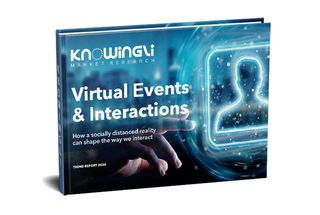FREE REPORT: The Inevitable Rise of Virtual Events in a Post-Pandemic World
How a socially distanced reality can shape the way we interact

The world has officially gone virtual. As industries respond to shifting consumer preferences in the wake of COVID-19, along with a widespread demand for pandemic-specific innovation, the new socially distanced reality is rapidly shaping the way we do business and interact. Understandably, some industries and experiences are subject to more change than others — and the events industry, specifically, now faces a makeover of epic proportions.
Where we once expected events to consist of grand concert halls or conference rooms bustling with excited attendees, we now realize the potential for virtual gatherings and online experiences. In a recent article for Forbes, Ruben Castano, the CEO of the virtual events company '6Connex', shared that their business of virtual events has grown by 1,000% over the last few months and have been working overtime and hiring non-stop to keep up with the demand. Interest is coming from colleges, sports teams, and international businesses.
There is simply no denying it. The reimagined events industry is here, and it's rife with contactless innovations. To better understand the changing landscape of virtual interactions and events, our data partner GWI performed online market research among 1,998 respondents aged 16-64 in the U.S. and 1,001 respondents in the UK., aimed at answering the following questions:
- Has the pandemic mitigated the ongoing frustration with technology?
- Are virtual interactions here to stay?
- What do consumers expect from virtual events?
- How can virtual events be monetized?
- How can the events industry adapt to a socially distanced future?
Tech-Friendly?
Notably, the report revealed that the tech-induced anxiety consumers have frequently exhibited over the years as technology encroached on traditional touchpoints has slowed down. Although the demand for enhanced user convenience has always been paramount and acted as a catalyst to digital innovation, technology was often viewed as a 'double-edged sword.'
Convenience, it was often assumed, came at the price of data privacy and security concerns. In the wake of the pandemic, however, technology emerges as the primary tool keeping us connected during a difficult time. The report notes that, while skepticism toward tech hasn't entirely vanished, the outbreak has effectively challenged the idea that digital transformation and the endless connectivity that comes with it are toxic threats that detach us from the intimacy of the real world. Since the outbreak began, 2 million people have joined more than 2,000 local online COVID-19 community support groups, reiterating the takeaway that virtual spaces have the power to combat feelings of fear and loneliness.
Moreover, 4 in 10 internet users say social media has helped them feel less anxious or stressed over the past two months.
Of course, technological literacy also plays a primary role in the proliferation of tech angst amongst consumers, and, fortunately, Global Web Index's report indicates that tech literacy will be less of a barrier going forward. Their findings revealed that consumers who identify as less tech-literate are actually more likely than average to say they'll keep online communications in their lives even when social distancing restrictions are lifted. In fact, 55% of them expect to continue communicating online once restrictions are lifted. As circumstances of the pandemic continue to normalize virtual experiences, it seems that tech literacy has finally expanded beyond the digital natives to reach larger numbers of older consumers who were previously apprehensive.
But what does this mean for virtual events?
Well, to start, it's important to note that virtual events shouldn't be treated as digital equivalents of physical shows. The successful implementation of effective and engaging online experiences, it seems, isn't quite that simple. The report notes that virtual events hold a bigger potential that can only be utilized if organizers move away from trying to replicate the perks of physical events in the online space.
According to the report, 8 in 10 consumers have recently attended a virtual event, including training sessions, concerts, and fitness classes, among others. Based on this data, we derive that virtual event attendees crave engaging digital experiences brought to life with high-quality video elements and unique interactive event models. Specifically, attendees want to actively participate in the virtual events they attend, not passively consume content, with data showing that the most important aspects of virtual events for fans are about interaction, shared experiences, and quality.
Finally, what does this mean for those hosting the events?
Will the rise of virtual experiences negatively impact the bottom line of those businesses which rely on the successful implementation of year-round events?
Monetization of Virtual Events
It would seem that virtual events could prove more profitable than real-life ones in the near future. According to the survey, the vast majority of consumers aren't comfortable going back to venues just yet, and in-person events will not be able to sell at 100% capacity. In fact, in the U.K. and the U.S., around 6 in 10 consumers say they won't return to both large outdoor and indoor venues for some time or for a long time.
Fortunately, selling tickets isn't the only revenue stream in the digital world, as best demonstrated by the esports industry. To this effect, the report notes that virtual concert fans are 2.8x as likely as the average internet user to want to directly support performers on a virtual event. They're also 2.6x as likely to want to buy merchandise during the event. From donations to merchandise, virtual events boast no shortage of monetization potential and engagement opportunities.
Virtual events may have come to the forefront of our consideration out of necessity, but all the signs point to them having the potential to make a long-lasting impact on many industries.
Want all the deets? Click here to download the full report.
Alan Young
Co-Founder, Knowingli Market Research and Puzzle Partner
+1 855-566-9492
Knowingli